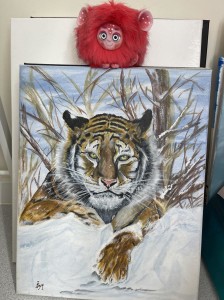24.05.2025
Oksana Zhukova(Sky) Fairy Tale from Fuksik
 Fuksik, the hero of my «Tales of the Pink Lake» and co-host of our project «Fairy Tale Therapy » confessed to me that he has a new stage in his creativity and wants to write only fairy tales for adults. This fairy tale story about his friends Swan and Tiger, sad, but very romantic.
Fuksik, the hero of my «Tales of the Pink Lake» and co-host of our project «Fairy Tale Therapy » confessed to me that he has a new stage in his creativity and wants to write only fairy tales for adults. This fairy tale story about his friends Swan and Tiger, sad, but very romantic.
*The Tale of the Tiger and the Swan*
 Once upon a time, on an island of snow and ice, there lived a tiger. He was fiery-orange and striped, with eyes the color of green frost and a soul as cold as winter. His heart had never known warmth: he hunted in silence, slept alone, and even the moon, when it peeked into his den, could not linger—he was too cold even for her.
Once upon a time, on an island of snow and ice, there lived a tiger. He was fiery-orange and striped, with eyes the color of green frost and a soul as cold as winter. His heart had never known warmth: he hunted in silence, slept alone, and even the moon, when it peeked into his den, could not linger—he was too cold even for her.
Companions came and went like northern winds—some tried to warm him, some dreamed of taming him, but he remained unchanged. A predator. Alone. Free. He didn’t believe in love, considering it a myth for the weak.
But everything changed one spring.
When the sun touched the snowy plains for the first time in ages, the ice on one of the lakes began to crack. The tiger wandered there—not for food, just because. And then he saw her.
On the water, among shards of ice, floated a swan. White like him, but alive, warm, full of light. Her movements were slow, graceful, like music he’d never heard before. He didn’t understand what he was feeling, but for the first time, the heart that had been frozen for so many winters began to crack.
He couldn’t look away. Every day, he returned to the lake. He brought her food. He warmed her with his body. He carried her on his back through snowy trails until she gently rested her head on his neck. He spoke no words—tigers do not speak—but she heard his heart, now beating for her.
But they were different. She—a creature of water and sky. He—a beast of earth and frost. She longed for the south, the warmth, the other swans. He was bound by snow, silence, and solitude. One day, she looked up at the sky—and he understood: it was time.
He walked her to the lake’s edge. She spread her wings and rose, circling above him for a long time, as if unsure whether to leave. And then she vanished into the clouds.
He returned to his den. But now it felt empty. He no longer hunted so fiercely, no longer growled, no longer hid from the moon. Sometimes he would go to the lake, hoping to see a white shape on the water. Sometimes he heard cries in the sky—and stared upward until his eyes ached.
Fuchsik decided to seriously study psychology and here are the conclusions he made from this story of his friends:
This tale is about transformation. About how even the most closed, frozen heart can change under the influence of love. But love is not always about “happily ever after.” Sometimes it’s a meeting that divides life into “before” and “after.” Sometimes love comes to show a person they are capable of feeling—and leaves, taking with it both light and pain.
The tiger is a metaphor for a man who has closed himself off from the world—traumatized, emotionally distant. His predator’s image is a defense mechanism, born of loneliness or perhaps early loss. He fears attachment because he doesn’t believe it can last. The swan symbolizes beauty, purity, an idealized feminine principle. She appears as an archetype of the Anima (in Jungian psychology)—awakening, inspiring, but not meant to stay. Their inability to be together reflects the conflict between reason and emotion, between desire and reality, between the need for connection and the fear of vulnerability.


